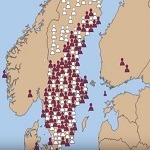It was by accident that the Official Statistics of Sweden revealed that Sweden is importing highly fertile Africans to hide the country’s child-friendly policy failure.
All productive white nations are in a demographic decline, and so is Sweden. The feminist authorities in Sweden maintain that they can combine gender equality, which among others translates into a high women labour participation, with a childbearing level that is sufficient to sustain the welfare state. The Swedish media and academics proclaimed over and over again that Swedish women are outstanding in giving birth to children. It is a widely published fact that the country’s childbearing is close to the replacement rate of 2.1.
However, a closer look at the data reveals that Swedish women’s fertility is a meagre 1.66, i.e. as low as the Dutch and slightly better than German. The data of the Official Statistics of Sweden also shows that Sweden in order to meet its demographic objectives is importing highly fertile women from the world’s most impoverished countries. Continue reading


















